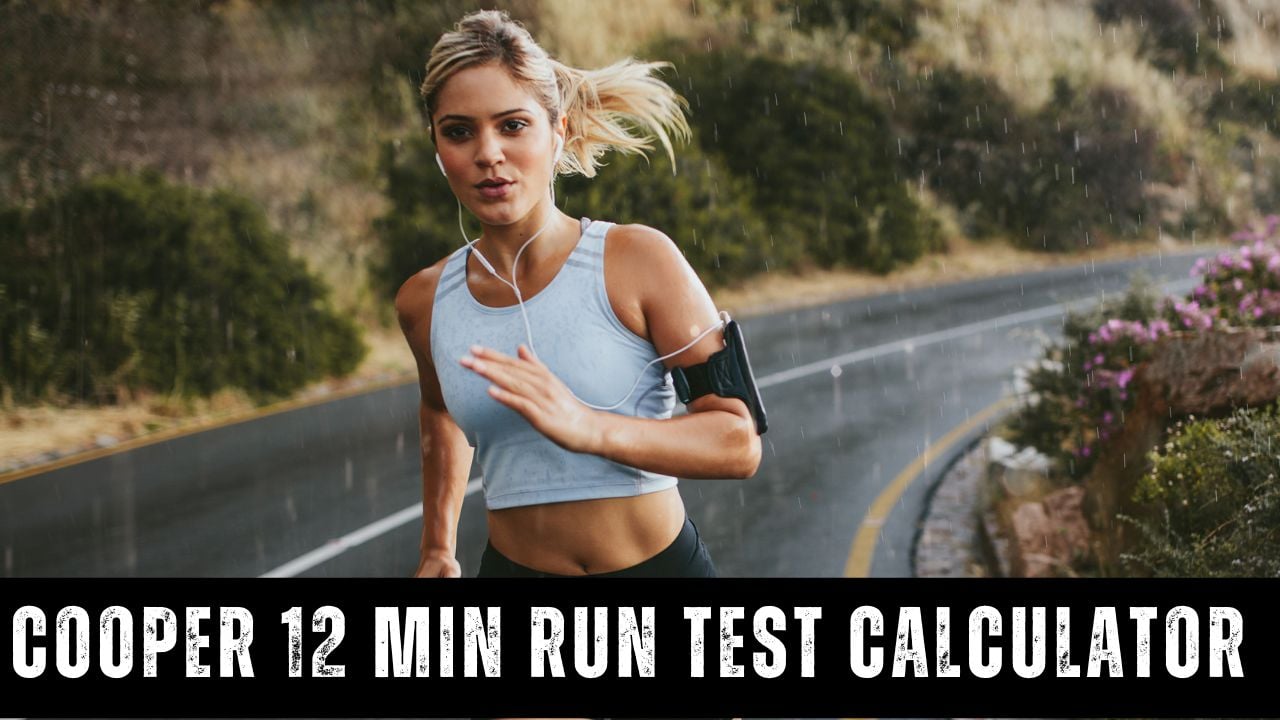Cooper 12-Minute Run Test Calculator

What is the Cooper 12-Minute Run Test?
The Cooper 12-Minute Run Test, developed by Dr. Kenneth Cooper in 1968, is a widely recognized field test for assessing aerobic fitness and estimating VO2 Max (maximal oxygen uptake). Originally designed for the United States military, it has become a standard fitness assessment tool for athletes, fitness enthusiasts, law enforcement agencies, and sports teams worldwide.
The test requires you to run or jog as far as possible in exactly 12 minutes on a flat, measured course (typically a 400-meter track). Your total distance covered is used to calculate your VO2 Max using Dr. Cooper's validated formula. Research validates the Cooper Test as a reliable predictor of cardiorespiratory fitness with a strong correlation (r = 0.85-0.93) to laboratory-measured VO2 Max.
Unlike laboratory VO2 Max testing that requires expensive equipment and trained technicians, the Cooper Test provides a practical, accessible alternative requiring only a stopwatch and a measured distance. It's an excellent tool for tracking fitness improvements over time and establishing baseline cardiovascular endurance. Learn more about benefits of cardiovascular fitness.
Cooper Test Formula & Calculation
Example Calculation:
If you run 2,400 meters (1.49 miles) in 12 minutes:
VO2 Max = (2400 - 504.9) / 44.73 = 42.4 ml/kg/min
This indicates "Good" fitness for a 30-year-old male
🔬 How the Formula Works
Dr. Cooper's formula is based on extensive research correlating running performance with laboratory VO2 Max measurements. The formula accounts for the linear relationship between running velocity and oxygen consumption at submaximal intensities.
Key Formula Components:
- Distance in meters: Total distance covered in 12 minutes
- 504.9: Baseline constant representing minimal aerobic capacity
- 44.73: Conversion factor derived from regression analysis
The test assumes you maintain a relatively steady pace throughout the 12 minutes. Pacing strategy significantly affects results—starting too fast can lead to fatigue and reduced total distance, while a controlled, sustainable pace optimizes performance.
Cooper Test Fitness Standards & Norms
| Age Group | Sex | Superior | Excellent | Good | Fair | Poor |
|---|---|---|---|---|---|---|
| 20-29 | Male | >2.4 km (1.50 mi) | 2.2-2.4 km | 2.0-2.2 km | 1.8-2.0 km | <1.8 km |
| 20-29 | Female | >2.1 km (1.31 mi) | 1.9-2.1 km | 1.7-1.9 km | 1.5-1.7 km | <1.5 km |
| 30-39 | Male | >2.3 km (1.43 mi) | 2.1-2.3 km | 1.9-2.1 km | 1.7-1.9 km | <1.7 km |
| 30-39 | Female | >2.0 km (1.24 mi) | 1.8-2.0 km | 1.6-1.8 km | 1.4-1.6 km | <1.4 km |
| 40-49 | Male | >2.2 km (1.37 mi) | 2.0-2.2 km | 1.8-2.0 km | 1.6-1.8 km | <1.6 km |
| 40-49 | Female | >1.9 km (1.18 mi) | 1.7-1.9 km | 1.5-1.7 km | 1.3-1.5 km | <1.3 km |
| 50-59 | Male | >2.0 km (1.24 mi) | 1.8-2.0 km | 1.6-1.8 km | 1.4-1.6 km | <1.4 km |
| 50-59 | Female | >1.7 km (1.06 mi) | 1.5-1.7 km | 1.3-1.5 km | 1.1-1.3 km | <1.1 km |
| 60+ | Male | >1.8 km (1.12 mi) | 1.6-1.8 km | 1.4-1.6 km | 1.2-1.4 km | <1.2 km |
| 60+ | Female | >1.5 km (0.93 mi) | 1.3-1.5 km | 1.1-1.3 km | 0.9-1.1 km | <0.9 km |
Note: Classifications based on Cooper Institute research and ACSM standards. Individual performance varies based on training status, genetics, and environmental conditions (temperature, altitude, surface).
How to Perform the Cooper Test
📋 Test Preparation
24-48 Hours Before:
- Avoid intense exercise to ensure full recovery
- Maintain normal diet and hydration
- Get adequate sleep (7-9 hours)
- Avoid alcohol and excessive caffeine
Day of Test:
- Eat a light meal 2-3 hours before testing
- Hydrate adequately (500ml water 1-2 hours before)
- Wear appropriate running shoes and comfortable clothing
- Choose optimal conditions (moderate temperature, minimal wind)
- Perform a 10-15 minute warm-up with dynamic stretching
🏃 Test Execution
Step-by-Step Protocol:
- Location: Use a 400m track or measured flat course
- Start Position: Stand at the starting line, ready to begin
- Start Timer: Begin running when the timer starts
- Pacing: Maintain a challenging but sustainable pace. You should be able to speak in short phrases but not comfortably converse
- Lap Counting: Keep track of completed laps if using a track
- Final Push: Give maximum effort in the last 1-2 minutes
- Stop at 12 Minutes: Mark your position when time expires
- Measure Distance: Calculate total distance covered
- Cool Down: Walk for 5-10 minutes, don't stop abruptly
💡 Pacing Strategy: Start at 85-90% effort for the first 10 minutes, then increase to maximum effort for the final 2 minutes. This prevents early fatigue while allowing a strong finish.
⚠️ Safety Considerations
The Cooper Test is a maximal effort assessment and not suitable for everyone. Consult your physician before testing if you:
- Have cardiovascular disease or risk factors
- Are sedentary or haven't exercised in 6+ months
- Are over 40 years old (men) or 50 years old (women) without regular exercise
- Have musculoskeletal injuries or chronic conditions
- Experience chest pain, dizziness, or shortness of breath
Stop the test immediately if you experience: chest pain, severe shortness of breath, dizziness, nausea, leg cramps, or any unusual symptoms. Your safety is more important than test completion.
Cooper Test FAQs
❓ How accurate is the Cooper Test?
The Cooper Test has a strong correlation (r = 0.85-0.93) with laboratory-measured VO2 Max, indicating high accuracy for field testing. However, it has ±10-15% variability compared to gold-standard metabolic cart testing. Accuracy depends on proper pacing, environmental conditions (temperature, wind, altitude), running surface, and effort level. While less precise than laboratory tests, it's excellent for tracking progress over time when conditions are consistent.
🏃 What's a good Cooper Test score?
"Good" varies by age and sex. For a 30-year-old male, covering 2.0-2.2 km (1.24-1.37 miles) is "Good," while >2.3 km (1.43+ miles) is "Excellent" or "Superior." For a 30-year-old female, 1.6-1.8 km (0.99-1.12 miles) is "Good," and >2.0 km (1.24+ miles) is "Excellent" or "Superior." Recreational runners typically achieve 1.5-2.0 km, competitive runners 2.2-2.6 km, and elite distance runners 2.8-3.2+ km.
⏱️ How often should I retest?
Retest every 6-8 weeks during training cycles to assess progress. More frequent testing (monthly) can be useful but may interfere with training if not properly scheduled. Allow 4-6 weeks of consistent training between tests to see meaningful improvements. Always retest under similar conditions (same location, time of day, temperature, recovery status) for valid comparisons. Expect 5-15% improvements over 8-12 weeks with proper training.
🌡️ Does temperature affect results?
Yes, significantly. Optimal testing conditions are 50-60°F (10-15°C). Performance decreases 3-5% in temperatures above 75°F (24°C) and 5-10% above 85°F (29°C) due to increased cardiovascular strain and dehydration risk. Cold temperatures below 40°F (4°C) can reduce performance 2-4% due to increased muscle stiffness and respiratory discomfort. Test in moderate conditions when possible, or account for temperature effects when comparing results.
🏃 Can I walk during the test?
While technically allowed, walking significantly reduces your distance and VO2 Max estimate. The test is designed for continuous running or jogging. If you must walk, it indicates the pace was too aggressive initially. For best results, find a sustainable running pace you can maintain for the full 12 minutes. If you're unable to run continuously, consider the Rockport 1-Mile Walk Test as a lower-intensity alternative.
🎯 How does my score compare to athletes?
Recreational runners average 1.8-2.2 km, club-level competitive runners 2.3-2.7 km, regional/national competitors 2.8-3.2 km, and elite international distance runners 3.3-3.6+ km. For context, a 3.0 km Cooper Test (~60-65 ml/kg/min VO2 Max) represents strong endurance fitness suitable for competitive 5K-marathon racing. Elite marathon runners (VO2 Max 70-85) can exceed 3.5 km, though most don't specifically train for this test.
⚕️ Medical & Testing Disclaimer
This Cooper Test calculator provides VO2 Max estimates based on Dr. Kenneth Cooper's validated formula and should not replace professional medical assessment or laboratory testing. The Cooper 12-Minute Run Test is a maximal effort assessment that may not be suitable for individuals with cardiovascular disease, respiratory conditions, musculoskeletal injuries, or those who are sedentary.
Consult your physician before performing the Cooper Test, especially if you have risk factors for heart disease, are over 40 years old (men) or 50 years old (women) without regular exercise, or have any chronic medical conditions. Stop the test immediately if you experience chest pain, severe shortness of breath, dizziness, nausea, or any unusual symptoms.
For clinical populations, athletes requiring precise measurements, or individuals unable to run continuously for 12 minutes, laboratory VO2 Max testing with metabolic analysis is recommended. This calculator is for educational and fitness tracking purposes only and does not provide medical advice.
Related
- Barbell Racking Calculator
- Push-Up Weight Calculator
- Wilks Calculator
- One-Rep (1RM) Max Calculator
- One-Rep Max (1RM) Bench Press Calculator
References
- Cooper, Kenneth H. (January 1969). Aerobics. Bantam Books. ISBN 978-0-553-14490-1.
- Cooper Test: A 12-Minute Run to Check Aerobic Fitness". Archived from the original on 2016-03-06. Retrieved 2010-06-19.
- COOPER, K.H. (1968) A means of assessing maximal oxygen intake. JAMA. 203, p. 135-138
- Mayorga-Vega D, Bocanegra-Parrilla R, Ornelas M, Viciana J. Criterion-Related Validity of the Distance- and Time-Based Walk/Run Field Tests for Estimating Cardiorespiratory Fitness: A Systematic Review and Meta-Analysis. Fraidenraich D, ed. PLoS ONE. 2016;11(3):e0151671. doi:10.1371/journal.pone.0151671.
- Bandyopadhyay, A. (2015). "Validity of cooper's 12-minute run test for estimation of maximum oxygen uptake in male university students". Biology of Sport. 32 (1): 59.

Manish is a NASM-certified fitness and nutrition coach with over 10 years of experience in weight lifting and fat loss fitness coaching. He specializes in gym-based training and has a lot of knowledge about exercise, lifting technique, biomechanics, and more.
Through “Fit Life Regime,” he generously shares the insights he’s gained over a decade in the field. His goal is to equip others with the knowledge to start their own fitness journey.
